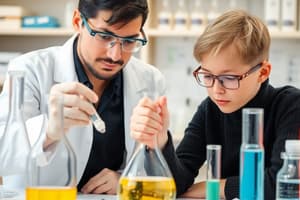Podcast
Questions and Answers
Which of the following best describes the main components under the umbrella of science?
Which of the following best describes the main components under the umbrella of science?
- Theories, laws, and principles
- Factual, conceptual, and theoretical knowledge
- Observation, classification, and communication
- Process skills, scientific attitudes, and scientific contents (correct)
Factual knowledge involves understanding the interrelationships among basic elements within the body of knowledge.
Factual knowledge involves understanding the interrelationships among basic elements within the body of knowledge.
False (B)
Which category of process skills primarily involves transmitting information?
Which category of process skills primarily involves transmitting information?
- Measuring
- Classifying
- Observing
- Communicating (correct)
Which scientific attitude involves a positive perspective when encountering setbacks or failures?
Which scientific attitude involves a positive perspective when encountering setbacks or failures?
What role do teachers play in students' development of scientific values?
What role do teachers play in students' development of scientific values?
The process skill of 'interpreting data' involves looking for ______ and using them to formulate a conclusion.
The process skill of 'interpreting data' involves looking for ______ and using them to formulate a conclusion.
Match the following scientific attitudes with their descriptions:
Match the following scientific attitudes with their descriptions:
Which of the following is the closest interpretation of the term 'Defining operationally' in process skills?
Which of the following is the closest interpretation of the term 'Defining operationally' in process skills?
According to the provided text, science curriculum at the basic education level fully meets the expectations of industry and society.
According to the provided text, science curriculum at the basic education level fully meets the expectations of industry and society.
What is the stated vision for the development of Grades 1-10 curriculum?
What is the stated vision for the development of Grades 1-10 curriculum?
Which of the following best describes the 'Law and Principle' within the body of knowledge?
Which of the following best describes the 'Law and Principle' within the body of knowledge?
The process skill of 'experimenting' involves investigating the effects of the ______.
The process skill of 'experimenting' involves investigating the effects of the ______.
Which of the following is NOT listed as part of the importance of science education?
Which of the following is NOT listed as part of the importance of science education?
The current (or present) science curriculum is designed for all students, regardless of their future academic plans.
The current (or present) science curriculum is designed for all students, regardless of their future academic plans.
Name three scientific values highlighted in the text.
Name three scientific values highlighted in the text.
Which factor does NOT directly affect the low performance of students in science, according to the text?
Which factor does NOT directly affect the low performance of students in science, according to the text?
The term 'using numbers' refers to counting, computing, and using ______ relationships.
The term 'using numbers' refers to counting, computing, and using ______ relationships.
Match the process skills with their respective descriptions:
Match the process skills with their respective descriptions:
Which of the following is NOT one of the guiding principles of the science curriculum framework?
Which of the following is NOT one of the guiding principles of the science curriculum framework?
Consideration of premises and consequences is an element of scientific values.
Consideration of premises and consequences is an element of scientific values.
Flashcards
What are Science Process Skills?
What are Science Process Skills?
Skills used to investigate, understand, and interact with the world. Includes observing, measuring, inferring, predicting, and experimenting.
What is the "Body of Knowledge"?
What is the "Body of Knowledge"?
The total amount of information available regarding how humans understand the world.
What is Factual Knowledge?
What is Factual Knowledge?
Basic facts or pieces of information.
What is Conceptual Knowledge?
What is Conceptual Knowledge?
Signup and view all the flashcards
What are Scientific Theories?
What are Scientific Theories?
Signup and view all the flashcards
What are Scientific Laws and Principles?
What are Scientific Laws and Principles?
Signup and view all the flashcards
What is Observing?
What is Observing?
Signup and view all the flashcards
What is Communicating?
What is Communicating?
Signup and view all the flashcards
What is Classifying?
What is Classifying?
Signup and view all the flashcards
What is Using Numbers?
What is Using Numbers?
Signup and view all the flashcards
What is Measuring?
What is Measuring?
Signup and view all the flashcards
What is Predicting?
What is Predicting?
Signup and view all the flashcards
What is Inferring?
What is Inferring?
Signup and view all the flashcards
What is Defining Operationally?
What is Defining Operationally?
Signup and view all the flashcards
What is Interpreting data?
What is Interpreting data?
Signup and view all the flashcards
What is Formulating Hypothesis?
What is Formulating Hypothesis?
Signup and view all the flashcards
What is identifying and controlling Variables?
What is identifying and controlling Variables?
Signup and view all the flashcards
What is Experimenting?
What is Experimenting?
Signup and view all the flashcards
What is Model-building?
What is Model-building?
Signup and view all the flashcards
What is Curiosity?
What is Curiosity?
Signup and view all the flashcards
Study Notes
- Science encompasses process skills, scientific attitudes/values, and scientific content.
- Body of knowledge serves as a source of information to understand the world.
- The body of knowledge has four branches: factual, conceptual, theories, and laws/principles.
- Conceptual knowledge entails interrelationships among basic elements.
- Theories are explanations that appear to be true.
- Laws and principles are explanations that are proven true.
- Process skills involve activities that engage students in the use of scientific processes and realize concepts embedded in science topics.
Categories of Scientific Process Skills
- Basic process skills include observing and communicating.
- Observing involves using the five senses.
- Communicating involves transmitting information.
- Experimental process skills include controlling variables and forming hypotheses.
- Controlling variables involves the manipulation of variables.
Process Skills
- Observing uses five senses.
- Classifying involves sorting, classification, and hierarchical classification.
- Communicating transmits information.
- Using numbers includes counting, computing and using number relationships.
- Measuring involves making quantitative observations.
- Predicting forecasts future events.
- Inferring explains why events happened.
- Using space-time relationships identifies relative positions and motion of objects/changes over time.
- Defining operationally finds an equivalent way of measuring something indirectly.
- Interpreting data looks for patterns and uses them to formulate conclusions.
- Formulating hypotheses involves making an educated guess.
- Identifying and controlling variables includes manipulation of variables.
- Experimenting investigates the effects of variables.
- Model-building involves making concrete representations.
Science as Values
- Teachers should help students develop proper habits of mind and attitudes.
Scientific Attitudes (Wolfinger, 2000)
- Scientific attitudes include curiosity, honesty, willingness to suspend judgement, open-mindedness, skepticism and objectivity.
- Scientific attitudes also include a positive approach to failure, respect for the environment, and lack of superstition.
Scientific Values (National Research Council, 1996)
- Scientific values encompass longing to know/understand, questioning everything and searching for data/meaning.
- They also demand verification, respect logic, consider premises/consequences.
Teaching Science
- School science education is important for linkage to technology/industry, systematic learning, and prevention of cultural identity.
Challenges in Science Education
- Challenges include poor performance in international/national assessment studies.
Factors Affecting Low Performance of Filipino Students in Science (UP NISMED, 2005)
- Factors include the quality of teachers, teaching-learning processes, school curriculum, instructional materials and administrative support.
Findings
- Existing science curriculum at the basic education level needs to meet the expectations of the industry, university, and society.
- The present curriculum is overloaded, discipline-based and caters to college-bound students.
Project Team Vision
- Development of Grades 1-10 curriculum scientifically, technologically, and environmentally to create literate and productive members of society.
Project Team Core Group
- Consists of science educators, heads of professional science teachers' organizations, scientists/engineers, and senior specialists/researchers of DOST-SEI
The project team considers
- Core science concepts
- Learning how to learn
- Expectations for citizens in a technologically driven world
- Emerging social/global issues/concerns
- Curriculum planning/design.
Project Team For Whom
- Curriculum developers
- Faculty of Teacher Education institutions
- Teachers
- School Administrators
- Policy makers
- Instructional material developers
Guiding Principles of Science Curriculum Framework
- Science is for everyone and is both content and process.
- School science should be relevant and useful
- School science should nurture interest in learning and demonstrate commitment to develop a culture of science.
Studying That Suits You
Use AI to generate personalized quizzes and flashcards to suit your learning preferences.




